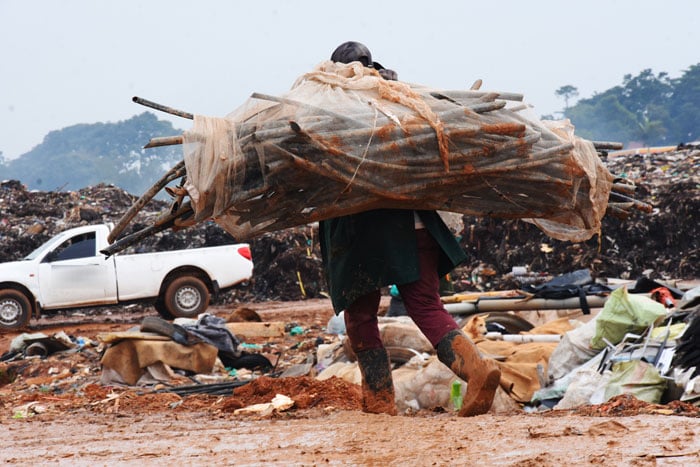
A man holds a tree seed bed in Mabira Forest. Some companies’ chief executives and senior managers are posturing as environmental crusaders when they are not. PHOTO/ MICHAEL KAKUMIRIZI
|Prosper
Prime
Companies aren’t living up to green claims
What you need to know:
Companies are exaggerating their green claims, which are also ‘too good to be true’ as they capitalize on the growing trend of being environmentally sustainable.
Eco-friendly. Sustainable, made from recycled plastics.
Companies are using these phrases to attract investors on the grounds of being environmentally sustainable.
But there is a huge mismatch between what most companies say about environmental sustainability and what they actually do about it, Prosper Magazine has learnt.
It has since emerged that businesses, including many multinational corporations operating in the country are simply paying lip service and not walking the talk regarding their environmental sustainability commitments.
Many have perfected the art of what has been known as green washing - process of conveying a false impression or misleading information about how a company’s agenda or action are either environmentally sound or geared towards mitigating or ensuring sustainability.
Some sector players through their umbrella association are moving to curb this tendency of green washing, that is increasingly taking shape. However, Prosper Magazine has observed countless companies’ chief executives and senior managers posturing as environmental crusaders yet a look at their organizations' activities, including their Corporate Social Responsibility (CSR) budget for environmental sustainability, at best is just a token – laughable.
Deception
In an interview with the executive director of Federation of Small and Medium-sized Enterprises, Mr John Walugembe, it became clear that several businesses in Uganda are deceptive when it comes to sustainability reporting.
“When you look at sustainability reports of many companies, they are really positive. Some even indicate efforts towards green investment but when you examine that portfolio, you realise that it has nothing to do with sustainability. It is just normal investment pretending to be a green sustainable enterprise,” said Walugembe, also an industry consultant and expert on green investment.
He continued: “Many companies do not have programmes to support sustainability, but just engage in tokenism actions with a view to garner some public good will and support towards their organisation, yet in real sense they are simply posturing.”
According to Walugembe, this kind of deception is not only morally wrong, but costly in the long run even to the businesses that have since perfected this habit.

Stakeholders from National Environment Management Authority, National Forestry Authority, American Tower Corporation Uganda, Stanbic Bank, Uganda Biodiversity Fund and Vivo Energy plant trees to restore Mabira Forest in May this year to mark International Biodiversity Day. PHOTO/ MICHAEL KAKUMIRIZI
He told Prosper Magazine that although green washing is wrong, given that businesses and corporations that should be in the forefront of ensuring sustainability are instead relegating it to the periphery, there is no need for criminalising the act, calling for self-regulation that can be implemented with the help of umbrella industry associations such as FSME.
“I don’t think it is government’s mandate to enforce that because it so much about corporate social responsibility. I believe companies can hold themselves up to the highest standards possible,” Walugembe says.
Even though green washing is when a company makes false claims that its business or products are environmentally friendly or purporting to be environmentally conscious for marketing purposes without making real efforts to walk the talk, Walugembe still thinks it is too early to introduce government control into the mix.
“With proper governance and internal checks and balances and some pressure from civil society organizations, companies can hold themselves to account and ensure those who are being hypocritical are exposed,” he said.
New concept
It became obvious that green-washing concept is not properly understood, arguing that some companies engage in it subconsciously – without knowing. For starters, the green-washing concept makes sense if you believe that climate change is an important issue or if you believe that the environment should be properly sustained.

Dozens of logs cut from a forest in Kaluguza, Kibale District. Sensitisation around climate change and environmental degradation should be increased. PHOTO/ MICHAEL KAKUMIRIZI
Mr Walugembe believes that sensitization around climate change and environmental degradation should first be upped. Then it will be easy to hold businesses to account because sustainability comes with a cost on the company’s bottom line. As long as consumers are not willing to pay premium prices for products or services that are environmentally friendly, then green washing could be around for a while.
For an economy like Uganda, Mr Walugembe suggests a mix will be needed to grow and develop the economy before, arguing that it will be difficult to industrialize using just solar energy, or wind energy alone for that matter.
In another interview with Economic Policy Research Centre (EPRC) researcher, Paul Corti Lakuma, it became clear that companies can actually shoot two birds with one stone.
He said: “What is commitment without action? There is no problem with a company achieving two objectives at a go: environmental sustainability and improving its public image.”
Leading the way
Manufacturers are already trying to do their bit. With Uganda Manufacturers Association (UMA) Green Industrial Agenda in place, a blue print that will limit if not eliminate green washing in the sector (manufacturing) contributing about 17 per cent to GDP, according to Uganda Bureau of Statistics and Ministry of Finance report.
According to UMA Green Industrial Agenda, sustainable manufacturing is the creation of manufactured products through economically-sound processes that minimize negative environmental impact, while conserving energy and natural resources.
Despite seeing some significant economic growth over the last few years, it has come at a cost to the environment, reads UMA Green Industrial Agenda.
For example, while Uganda has abundant renewable energy sources, including hydro, and solar, the country’s industrial sector is yet to fully harness these resources, notes the UMA statement.
“Despite having ample renewable energy sources, such as hydro and solar power, the industrial sector has yet to fully utilize these resources. Instead, it heavily relies on non-renewable energy sources, including fossil fuels. The sustainable growth of the industry requires balancing with environmental conservation,” reads the UMA Green Industrial Agenda.
Additionally, the manufacturing sector is a significant stakeholder in the efforts to reduce hazardous and manage waste and factory emissions.
Coordinate troops
The UMA national programme on green industry prioritizes the use of renewable energy sources and promotes sustainable manufacturing practices to support the country’s development in a way that is environmentally conscious and economically viable, as the population grows, so is the need for economic growth.
This triggers faster rates for urbanization, industrialization, agriculture and infrastructural facilities. And for that “there is need for a holistic sector level intervention, which is beneficiary driven,” notes the UMA report.

A man carrying plastic pipes after sorting them from the waste in Kiteezi landfill. PHOTO/MICHAEL KAKUMIRIZI
It further noted that: “This programme is designed to coordinate, harmonise and aggregate efforts of industrialists in Uganda to avert, mitigate, and reduce the causes of environmental hazards and improve or promote sustainable actions for a circular economy.
Mainly the manufacturers will be looking for the sector players to focus on promoting green manufacturing practices by conserving of the natural eco system, reducing carbon emissions, promoting use of renewable energy, energy efficiency and energy efficient technologies and waste management.
Mitigation
Meanwhile, according to a report by Advocates Coalition for Development and Environment (ACODE), an independent public policy research and advocacy think tank in the country and a member of Green Economy Coalition, most micro, small and medium firms (MSMES) in the country cannot transition to green enterprises because of limited or lack of financing. The reports indicate that MSMES lack financial support to help them transition into a Local Green Enterprise (LGE).
ACODE executive director Dr Arthur Bainomugisha hopes Uganda Development Bank takes up financing to green investments at much lower interest rates, something the government development bank is already considering.
Experts’ take
Further, in an era like this where climate change and its effects are rife, according to climate experts, sustainability and environment preservation and related projects are at the heart of many operations today, explaining why many companies want to be seen as environmental crusaders.
However, with that comes green washing where companies and civil society organisation are overstating their sustainability efforts.
This practice is not privy to only marketing campaigns but also in climate change projects - where many fall short on environmental sustainability as pitched before being granted funding.
Ms Christine Mbatuusa, programme manager, Environmental Management for Livelihood Improvement, says this is avoidable.
When promoting climate change projects, she emphasizes inclusion and multi-stakeholder engagement starting at the district local government level. “It is they who will show you if the proposed project will benefit the community. Then they will align the community and get you in touch with the contact people,” she says.
Ms Mbatuusa says it starts with working with them in doing the feasibility studies so they appreciate the project.
“These leaders know what their community needs to combat climate issues and hence will advise. When the locals’ ideas are incorporated, their needs are well represented hence easily owning and supporting its implementation. Otherwise, they will not be bothered,” she says.
Mbatuusa adds that during project designing, there is need to add a monitoring component to ensure the implementers are doing the right thing and finances are reaching the intended people. That way, implementers are held accountable.
However, most of the projects are in remote places hence the need to add facilitation to the budget.
“Additionally, the progress reports should be reviewed and publicised for whoever needs the information to keep tabs on what is happening. These also inform decisions on what needs to be changed or improved to ensure the project achieves its agenda,” she says.






